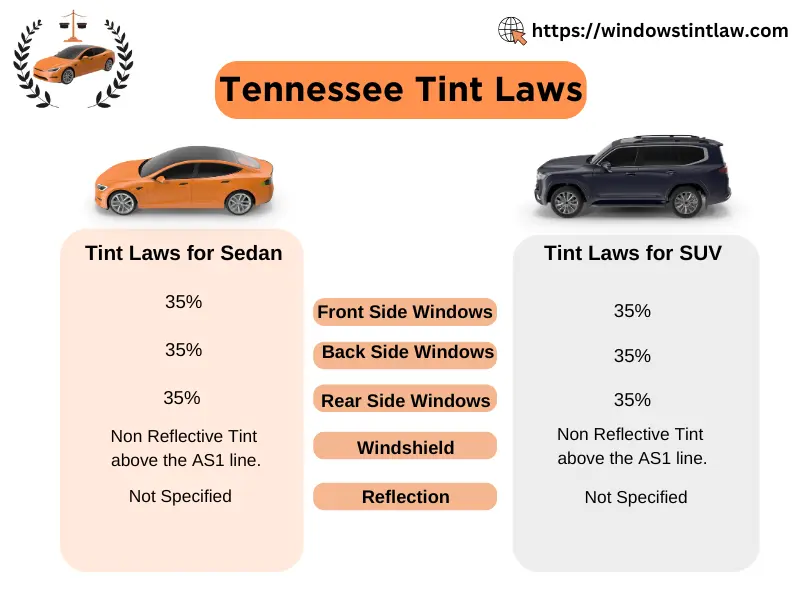Tennessee Window Tint Laws were legislated in 1990 which allows motorists to tint their vehicle windows.
We have provided the detailed insights about the Windows Tint Darkness, Tint Reflection, Medical Exemption from tint laws and Penalties for violating window tint laws.
We recommend drivers to must follow the state laws and save yourself from legal actions from the relevant authorities.
Overview of Tennessee Window Tint Laws
According to Tennessee Code Title 55. Motor and Other Vehicles § 55-9-107, Motor Vehicles can install tinted materials on Windshield and all other windows. For the Windshield 70% Visible Light Transmission is mandatory while 35% Visible Light penetration is required for Front side windows and back windows.
Tint darkness and Tint Reflection for Cars and SUV or Vans are defined in the below image.

Darkest Legal Tint in Tennessee
The darkest legal tint shades for Sedan and SUV or Multipurpose vehicles in Tennessee are given below:
| State | Front Side Windows | Back Side Windows | Rear Window | Windshield | Tint Reflection | Color Tints |
| Tennessee | 35% | 35% | 35% | Non Reflective Tint above the AS1 line. | Not Specified | No Restriction |
Window Tint Reflection in Tennessee
Tint reflection percentage are not specified in the Window tint laws, however mirrored or shiny appearance tinted materials are prohibited by state laws. This rule is applicable to Sedan and SUV or multipurpose vehicles to avoid shiny tinted materials which produce sparkling effect.
Other Rules and Regulations in Tennessee
Besides Tint Darkness and Tint Reflection limitations, some other rules are also required to be followed in Tennessee:
- Dual Side Mirrors: No limitations for dual side mirrors.
- Tint Colors: No Window tint colors are not specifically restricted.
- Certificates: Window film manufacturers are not required to get certifications of the Film they sell in Tennessee.
- Sticker: Stickers are required to display on vehicle windows, to certify that legal tint is installed.
Medical Exemptions
An individual with certain medical conditions can submit the statement to commissioner issued by licensed doctor certifying that the person has a medical issue that requires reduction of light transmission through windows of vehicle. The commissioner shall submit the statement to Medical review board and after successful evaluation, medical exemption certificate shall be provided.
Penalties and Violations
Any person Violating Tint laws commits Class C misdemeanor, and a fine of $100 to $230 depending on the violation.
